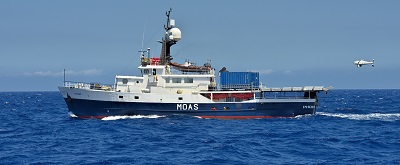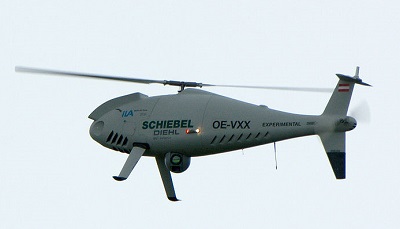Grim Reminder of Suffering Sparked Humanitarian Action

Regina Catrambone was on a summer holiday last year, sailing a chartered boat around the Mediterranean, when she happened to notice a jacket floating in the water. The captain told her it probably belonged to a migrant who drowned.
That was a moment of inspiration for Catrambone and her husband Christopher who have since set up their privately-funded organization Migrant Offshore Aid Station (MOAS).
“Although we have lived in Italy and Malta for many years, where migration is always a hot topic, this moment brought home more clearly the contrast that exists between people enjoying the Mediterranean Sea for leisure and those crossing the channel to seek refuge and protection,” she said. “Pope Francis visited Lampedusa shortly after our visit and he appealed to entrepreneurs to do what they could to prevent more loss of life at sea. This crystalized the idea in our hearts and minds.”
 The Malta-based couple raised millions of dollars to buy the second-hand research and training vessel Phoenix that now acts as a platform for aid at sea. The 40m boat had the space they wanted but needed considerable modification including the construction of a flight deck to host two drones (Schiebel camcopters). It has also been equipped with two rescue dinghies, a clinic and plenty of medical supplies and life jackets.
The Malta-based couple raised millions of dollars to buy the second-hand research and training vessel Phoenix that now acts as a platform for aid at sea. The 40m boat had the space they wanted but needed considerable modification including the construction of a flight deck to host two drones (Schiebel camcopters). It has also been equipped with two rescue dinghies, a clinic and plenty of medical supplies and life jackets.
The drones search the Mediterranean looking for migrant boats and help MOAS and other agencies determine what sort of assistance is required. “We are obeying the laws of the sea which oblige all vessels to cooperate with the Rescue Coordination Centres in search and rescue. We do not aim to ferry migrants from one country to another. Our main aim is to be an Offshore Aid Station that mitigates loss of life at sea.
“If we find migrants in the sea, it is again our obligation to save their lives. We have informed the Maltese and Italian authorities but do not expect any special treatment. We do not have a formal agreement but they are fully aware of our location all the time. They can ask us to help whenever they require it.”
 So far, the vessel has intercepted a Maltese fishing boat whose engine had failed. “We helped rescue a man and his young son. Yesterday we also spotted an empty dinghy. Its passengers may have been rescued or perished,” said Catrambone. ”If we even help to save one life, we would be extremely satisfied, because we consider the life of even one person to be priceless.”
So far, the vessel has intercepted a Maltese fishing boat whose engine had failed. “We helped rescue a man and his young son. Yesterday we also spotted an empty dinghy. Its passengers may have been rescued or perished,” said Catrambone. ”If we even help to save one life, we would be extremely satisfied, because we consider the life of even one person to be priceless.”
She accepts that she is not providing any ultimate solutions to the problem. Rather the vessel’s role is to prevent tragedies at sea. “Obviously, it would be ideal if these migrants were happy enough at home not to leave. However, the reality is that they are facing war and desperation at home. This is what makes them leave everything and risk their lives in a very dangerous sea in the hope of finding protection and refuge. If asylum processes were handled in North Africa, deaths would be prevented. But this is a long-term solution and in the meantime, many people are drowning every month.
“We are doing this to save lives because we think this is not the sole responsibility of Italy or Malta. Everyone who can provide assistance should do so. We are all global citizens.”
What would Catrambone say to the Pope now? “Thank you for inspiring us to dedicate our time, money and energy towards the service of others who are deeply in need. This project has not been easy, but we worked tirelessly to make it happen. Our faith helped us to persist despite the challenges.”
The opinions expressed herein are the author's and not necessarily those of The Maritime Executive.
